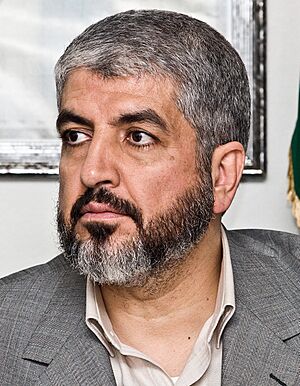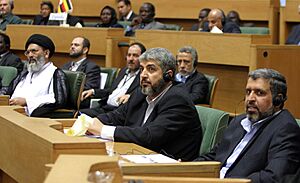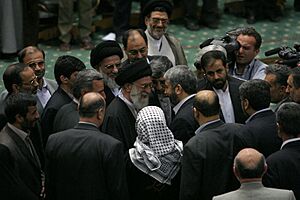Khaled Mashal facts for kids
Quick facts for kids
Khaled Mashal
خالد مشعل |
|
|---|---|

Mashal in 2009
|
|
| Chairman of the Hamas Political Bureau | |
|
Acting
|
|
| Assumed office 16 October 2024 Serving with Khalil al-Hayya, Zaher Jabarin, Muhammad Ismail Darwish, and an unnamed Hamas official
|
|
| Preceded by | Yahya Sinwar |
| In office 31 July – 6 August 2024 |
|
| Preceded by | Ismail Haniyeh |
| Succeeded by | Yahya Sinwar |
| 2nd Chairman of the Hamas Political Bureau |
|
| In office 1996 – 6 May 2017 |
|
| Deputy |
|
| Preceded by | Mousa Abu Marzook |
| Succeeded by | Ismail Haniyeh |
| Personal details | |
| Born | 28 May 1956 Silwad, Jordanian West Bank |
| Political party | Hamas |
| Spouse |
Amal Saleh Al-Boureni
(m. 1980) |
| Children | 7 |
| Residences | Silwad, West Bank (1956–1967) Kuwait City, Kuwait (1967–1990) Amman, Jordan (1990–1999) Doha, Qatar (1999–2001) Damascus, Syria (2001–2012) Doha, Qatar (2012–present) |
| Alma mater | Kuwait University (BSc) |
Khaled Mashal (Arabic: خالد مشعل, romanized: Khālid Mashʿal, born 28 May 1956) is a Palestinian politician. He was the leader of the Hamas Political Bureau from 1996 until May 2017. After that, Ismail Haniyeh took over. Mashal has also been the acting leader of Hamas two times. First, from July 2024 to August 2024, and again since October 2024. He is seen as one of Hamas's most important leaders.
Mashal was born in Silwad in 1956. His family had to leave Palestine because of the Six-Day War in 1967. Since then, he has lived in other Arab countries. Because of this, he was part of Hamas's "external leadership."
After Hamas was started in 1987, Mashal became the leader of its branch in Kuwait. In 1992, he helped create Hamas's main political group, called the politburo, and became its chairman. He became the main head of Hamas after other leaders were killed in 2004. Under his leadership, Hamas won many seats in the Palestinian election in 2006. Mashal stepped down as politburo chairman in 2017 when his term ended.
Contents
Early Life and Education
Mashal was born in 1956 in Silwad, which was then part of the Jordanian West Bank. He went to elementary school there. His father was a farmer who moved to Kuwait in 1957 to work. Mashal's father had also been involved in a Palestinian uprising in the 1930s.
After the 1967 Six-Day War, his family moved to Jordan and then joined his father in Kuwait. Mashal finished high school in Kuwait. In the early 1970s, he joined the Muslim Brotherhood, a large Islamic group.
In 1974, Mashal started studying at Kuwait University. He quickly became involved in student politics. He led a group called the Islamic Justice list in student elections. He later founded another student group called the Islamic League for Palestinian Students. He earned a degree in physics in 1978.
In 1975, when he was 19, Mashal visited Palestine for two months. This was his first time back since 1967. This trip made him feel even more connected to his homeland.
Political Journey
Starting in Politics
After college, Mashal worked as a physics teacher in Kuwait until 1984. In 1983, a secret meeting of the Palestinian Islamic movement took place. This meeting helped set up Hamas. Mashal was part of the leaders for this project. After 1984, he worked full-time on this project. When Iraq invaded Kuwait in 1990, Mashal and other Hamas leaders moved to Jordan.
Mashal was one of the first members of Hamas's politburo. He became its chairman in 1996, after the previous chairman was imprisoned.
Attack on His Life
On 25 September 1997, agents from Mossad, Israel's spy agency, tried to harm Mashal. They entered Jordan using fake passports. Two agents waited near the Hamas offices in Amman, Jordan. As Mashal walked into his office, one agent put a device near his ear that gave him a fast-acting poison. Mashal's bodyguards were suspicious and caught the agents.
Mashal described the attack as a "loud noise" in his ear. Later, he got a bad headache and started throwing up. He was rushed to a hospital, and his condition quickly got worse.
Jordan's King Hussein demanded that Israel's Prime Minister, Benjamin Netanyahu, provide the medicine for the poison. King Hussein was worried that if Mashal died, it could cause big problems in Jordan. The U.S. President, Bill Clinton, also got involved and told Netanyahu to give the medicine.
The head of Mossad flew to Jordan with the medicine. Doctors gave Mashal the medicine, which saved his life. Mashal later said that the attack made him feel more confident and brave. He believed he would only die when God decided, not when others tried to harm him.
Leaving Jordan
In August 1999, King Abdullah II of Jordan asked Hamas's "external leadership" to leave the country. The King was concerned that Hamas's actions might affect peace talks between Palestinians and Israel. Mashal and other Hamas leaders were arrested when they returned from a trip to Iran. They were accused of being part of an illegal group and having weapons, which they denied. Mashal left Jordan in November and first lived in Qatar. In 2001, he moved to Damascus, Syria.
Election Success
Hamas won most of the seats in the Palestinian election in 2006.
Mashal said in January 2006 that Hamas would not give up its weapons. However, he added that Hamas was willing to work with other Palestinian groups to form an army, like any independent country.
Prisoner Exchange
Mashal helped negotiate a deal to release an Israeli soldier named Gilad Shalit. Shalit had been captured by Palestinian groups, including Hamas. In exchange for Shalit, over 1,000 Palestinian prisoners held in Israel were released.
On 10 July 2006, Mashal said Shalit was a prisoner of war and asked for a prisoner swap. Israel first refused. In June 2008, Israel and Hamas agreed to a ceasefire. As part of this, talks about Shalit's release were expected to continue. In October 2009, after 20 Palestinian prisoners were exchanged for a video proving Shalit was alive, Mashal said they would try to capture more soldiers to free more prisoners.
Finally, in October 2011, Shalit was released. He was given back to Israel in exchange for 1,027 Palestinian prisoners.
Leaving Syria
In February 2012, as the Syrian civil war continued, Mashal left Syria and went back to Qatar. Hamas moved away from the Syrian government and closed its offices in Damascus. Mashal then announced his support for the groups fighting against the Syrian government.
Visit to Gaza
In December 2012, after a conflict between Israel and Hamas, Mashal visited Gaza for the first time. He stayed for four days to celebrate Hamas's 25th anniversary.
When he arrived at the border, Mashal knelt down and prayed. He was very emotional about the welcome he received. Mashal called his visit his "third birth." He said his first birth was when he was born, and his second was when he recovered from the poisoning attempt. He hoped for a "fourth birth" when all of Palestine would be free. He told the crowds that politicians owed a lot to the people of Gaza. He visited the homes of past Hamas leaders in Gaza City.
Speaking to thousands of people at Hamas's anniversary event, Mashal said that Hamas would never give up any part of historical Palestine. However, he also supported Palestinian President Mahmoud Abbas's efforts to get international recognition for the State of Palestine at the United Nations. Mashal believed that diplomacy could help the Palestinian cause, but it needed to be combined with "resistance." At the end of his visit, Mashal stressed that Palestinian unity was very important.
Stepping Down
Mashal stepped down as chairman of the politburo in 2017. Ismail Haniyeh, who lived in the Gaza Strip, took his place. This change meant that leadership moved from Hamas leaders living abroad to those living in Gaza. Before stepping down, Mashal presented the 2017 Hamas charter. This was an effort to make sure future leaders would follow the same policies.
His Beliefs
Mashal believes that the U.S. policy in the Middle East is not fair. He thinks the U.S. supports dictators who are friendly to them, but treats democratic leaders who disagree as enemies.
About Hamas
Mashal describes Hamas as a complete movement. He says it is an Islamic group, a nationalist group, a political group, and also has cultural and social parts. He explains that Hamas is not just a military group or a political party, but all of these things combined.
He also believes that being an Islamic movement does not mean being against Palestinian Christians or other groups. He says they are taught to encourage living together, talking, and working together.
Mashal sees Hamas's main goal as ending the Israeli presence, freeing the land and holy places, getting Palestinian rights back, and allowing refugees to return to their homes. He wants a future Palestinian state to be open to the world, without strong beliefs that exclude others, and to accept everyone.
Peace with Israel
Mashal believes that peace with Israel needs two main things. First, Palestinian refugees who left their homes in 1948 should be allowed to return. Second, Israel should leave the territories it took control of in the 1967 war. Israel has said it would not agree to all refugees returning.
In 2006, Mashal suggested a long-term truce. He said that Hamas does not fight Israelis because of their faith. He explained that their conflict is political, with those who came to their land and took control by force. He stated that Hamas would never accept losing their land or national rights. However, he added that if Israel was willing to agree to a long-term truce, Hamas would be ready to talk about the terms.
In a meeting with Russia's foreign minister in 2006, Mashal said that Israel must leave the land it occupied in 1967 and recognize the Palestinian right of return for peace to happen. He said Hamas is "for peace in the region... after the end of the occupation."
In 2008, Mashal met with former U.S. president Jimmy Carter. Mashal said that any agreement with Israel would need to be approved by the Palestinian people in a public vote. Mashal later suggested a 10-year truce if Israel moved back to the 1967 border. He saw this as a sign of recognition.
Gaza Blockade
Mashal believed that by limiting what could go into and out of Gaza, Israel hoped to make people suffer. He thought this would make them turn against Hamas. He disagreed with Israel's claim that the blockade was needed for safety. He argued that the blockade went against international law.
Personal Life
Mashal married Amal Saleh Al-Boureni in 1980 or 1981. They have three daughters and four sons. He currently lives in Qatar, where he moved in 2012.
See also
 In Spanish: Jaled Meshal para niños
In Spanish: Jaled Meshal para niños
- List of leaders of Hamas



